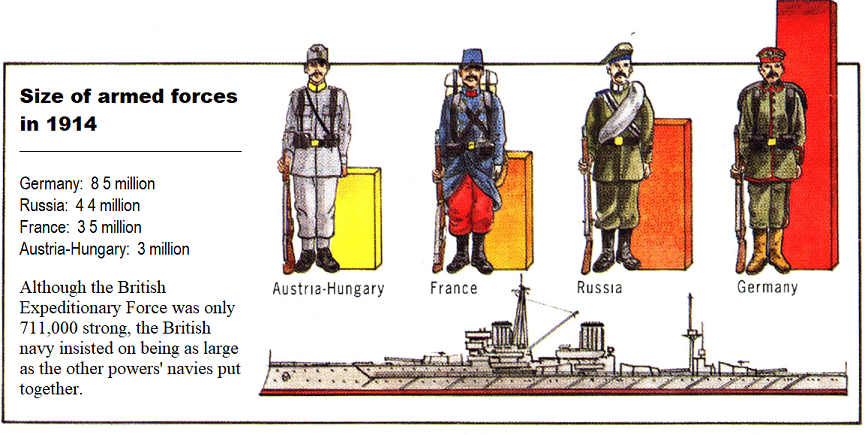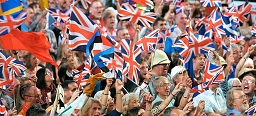
The Long-term Causes of the First World War

Introduction
The causes of the War went back long before 1914. It only needed a tiny spark to set all Europe at war.
Historians suggest that there were four 'long-term' causes of the First World War.
1. Nationalism
The most important of these pressures was nationalism – an extreme form of patriotism ... thinking your country is better than others (see Source 1). This caused hatred and rivalry between countries.
2. Imperialism
Nations who thought that they were greater than others felt they had the right to rule over others. So nationalism led to imperialism – the desire to conquer other lands and to build an empire. The European nations had conquered most of the rest of the world. The countries they owned were called colonies. Imperialism often caused conflict between the nations of Europe.
3. Militarism
This was a race to build the greatest armies and navies. It was another result of nationalism. Each nation was afraid of the others, and wanted to be able to defend itself. The nations of Europe built up huge armed forces (see table, below). By 1914, they were ready for war; all that was needed was something to start them fighting.

4. Alliances
Meanwhile, the countries of Europe formed themselves into two hostile alliances, the Triple Entente (France, Russia and Great Britain) and the Triple Alliance (Germany, Austria-Hungary and Italy). The system of alliances encouraged nations to be more aggressive. This was because they knew they could rely on the help of friends if there was a war. Like mountain climbers tied to the same rope, it pulled them into war when the crisis came.
After you have studied this webpage, answer the question sheet by clicking on the 'Time to Work' icon at the top of the page.
Links:
The following websites will help you research further:
GCSE Materials:
• this johndclare.net GCSE page looks at the
Background to the War in more detail
Nationalism:
The Promenade Concerts ('The Proms') were founded by
Sir Henry Wood in 1895. Even today, on the Last Night of the Proms,
audiences wave British fags and sing along to music that glorifies Great
Britain.

1. Nationalism
a. The French boasted about these national élan (spirit). The Marseillaise became France's national anthem in 1879. The French hated the Germans, who had defeated them in the war of 1870-1. The sixth verse runs:
The Marseillaise
Sacred love of the Fatherland,
Guide and support our
vengeful arms.
Liberty, beloved liberty,
Fight with your defenders (repeat)
Under our flags so that victory will rush to your manly strains;
That your dying enemies shall see your triumph and glory!
To Arms, citizens! Form your battalions,
Let us march, let us march!
That their impure blood should water our fields.
b. Germany had become a united country only in 1871, but the Germans were proud of their Technik (science and efficiency) and Kultur (art, history and way of life). Germany was also Britain's great rival for trade. By 1914, Germany's unofficial `national anthem' had become:
Germany, Germany over all,
over everything else in the world,
When it steadfastly holds together,
offensively and defensively,
with brotherhood...
c. The British did not think they were the greatest nation on earth – they knew it! British music hall audiences sang these songs:
Land of Hope and Glory
Land of hope and glory, mother of the free.
How shall we
extol thee, who are born of thee?
Wider still and wider shall thy
bounds be set;
God, who made thee mighty, make thee mightier yet (repeat)
Rule Britannia
Rule Britannia! Britannia rule the waves;
Britons never, never, never shall be slaves.